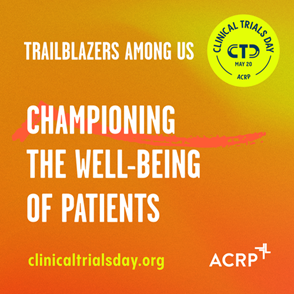Clinical Trials Day: Celebrating the trailblazers of wellbeing in research
Published in Healthcare & Nursing, Biomedical Research, and Public Health

Monday 20th May 2024 is Clinical Trials Day, marking 277 years since James Lind carried out the first controlled clinical trial to be properly recorded. While aboard HMS Salisbury, the Royal Navy surgeon successfully trialled treating scurvy by providing unwell sailors with oranges and lemons, comparing their swift recovery to other less successful methods trialled on other sailors on the same ship, like drinking cider, vinegar and even sea water. This cure would later be explained by the discovery that the disease is caused by a lack of Vitamin C, which citrus fruits are particularly rich in.
Nearly three centuries on, clinical trials are still central to scientific discoveries being made every day worldwide.

The theme of this year’s Clinical Trials Day is ‘Trailblazers Among Us’, which celebrates the relentless pursuit of knowledge and unique perspectives of clinical research professionals in the search for breakthroughs.
One of the ways a clinical research professional could be considered a trailblazer is through their championing of the wellbeing of patients. So, to mark Clinical Trials Day, we’re pointing the spotlight on five studies registered with ISRCTN which focus on wellbeing:
- In early 2020, the Institute of Public Health at the University of Cambridge registered a new initiative with ISRCTN, placing patients with Lupus into peer support groups where they could communicate to each other by email about the challenges of life with a long-term chronic health condition.
This originally aimed to see whether patients benefited from these support groups in general day to day life, but due to its timing on the cusp of the Covid-19 pandemic, the study took on the additional remit of examining the effect of the lockdowns on patients’ relationships, behaviour and wellbeing, as published results showed many lupus patients were categorised as Clinically Extremely Vulnerable and were recommended to shield in response. The researchers leading the trial found that more frequent communication and wellbeing support would have benefited these patients, but that the slower-paced ‘lockdown lifestyle’ would potentially lead to health benefits reducing fatigue and pain.
- Looking beyond the wellbeing of patients themselves, a study from the University of Exeter Medical School focused on the wellbeing of parent carers of disabled children. Often due to the intensiveness of their responsibilities, parent carers tend to have poorer mental and physical health when compared directly to other parents.
 Over the course of six weeks, a wellbeing program was delivered to parent carers, led by two parent carer facilitators. The factors focused on in the program were known as the 'CLANGERS' - Connect, Learn, be Active, Notice, Give, Eat well, Relax and Sleep. The purpose of the study was to establish whether the program could be delivered in the community on a wider scale through organizations with links to parent carers, and to test whether the program does improve health and wellbeing.
Over the course of six weeks, a wellbeing program was delivered to parent carers, led by two parent carer facilitators. The factors focused on in the program were known as the 'CLANGERS' - Connect, Learn, be Active, Notice, Give, Eat well, Relax and Sleep. The purpose of the study was to establish whether the program could be delivered in the community on a wider scale through organizations with links to parent carers, and to test whether the program does improve health and wellbeing.
- At Swansea University in Wales, Dr Menna Brown conducted a randomized control trial and registered it with ISRCTN as part of her PhD. This looked at the effectiveness of Acceptance and Commitment Therapy, a behavioral intervention designed to promote emotional wellbeing. Staff at selected organizations were invited to take part in a 12-week online course, and to choose a health challenge suited to their needs, taking part in a wellbeing questionnaire before and after to judge the outcomes of their course.
- Wellbeing at university is a topic which has received an increasing amount of attention from the UK media and beyond in the last few years. A study registered with ISRCTN from the Southern Health NHS Foundation Trust aims to focus on this until 2026, reflecting on the fact that the percentage of students experiencing mental health conditions has increased by up to 20% in recent years.
This study will collect information on access to student wellbeing services, satisfaction with these services, loneliness and social support over a period of five years, to draw conclusions which will be used to develop robust ways of supporting student wellbeing.
- Finally, wellbeing is not isolated to patients alone. Occupational burnout is well known to affect many healthcare professionals, including nearly half of all doctors. This study from the Rotherham, Doncaster and South Humber NHS Foundation Trust looks at burnout and its associated mental health symptoms, and will run until September 2025.
Led by the University of Sheffield’s Professor Jaime Delgadillo, the study allows doctors to participate in an 8-session program called Mind Management Skills for Life, to see if participation improves wellbeing and reduces burnout compared to those who have not yet completed the program.
You can browse all studies from the ISRCTN registry, a clinical trial registry supporting transparency in research through logging proposed, ongoing and completed studies involving human participants and populations, and you can find out more about Clinical Trials Day by visiting the Association of Clinical Research Professionals’ site here.

Follow the Topic
-
ISRCTN: The UK’s Clinical Study Registry

A primary clinical trial registry recognised by WHO and ICMJE that accepts studies involving human subjects or populations with outcome measures assessing effects on human health and well-being, including studies in healthcare, social care, education, workplace safety and economic development.





Please sign in or register for FREE
If you are a registered user on Research Communities by Springer Nature, please sign in